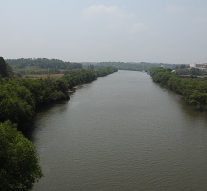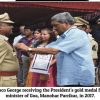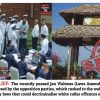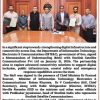Goa is abuzz with excitement as vintage bike and car owners, users, collectors and fans are decking […]

NAVIGATING RIVER MHADEI
Book Review September 20, 2025By Praveena Sharma
“THE River Mhadei – The Science and Politics of Diversion,” edited by Peter Ronald deSouza, Solano Da Silva and Lakshmi Subramanian, offers a window to diverse “epistemic collective” viewpoints on the 111-km long river snaking through Goa (52 km), Karnataka (35 km) and Maharashtra (27 km)
SO, it was decided the story of Mhadei River water dispute has to be written, filmed and spread far and wide.
But when does the story of Mhadei River begin? Not in 1970, when a proposal was drawn up by the Karnataka engineer S G Balekundri to divert the Mahadayi (known as Mhadei or Mandovi in Goa) water to the Malaprabha river basin.
No even in 1980s, when the idea gained momentum in the shape of Kalasa-Banduri Nala project. Definitely not in 2006, when the project’s foundation stone was laid in Kanakumbi in Belgaum.
It’s also not in 2010, when Mhadei Water Disputes Tribunal (MWDT) was set up by the central government to resolve the water-sharing dispute between the three western states.
It cannot be in 2018, when the MWDT delivered an interim order allocating 24 TMC of water to Goa, 13.42 TMC to Karnataka and 1.33 TMC to Maharashtra and set the next date for review in 2048.
It dates back millions of years, or perhaps more, to the geological age. It’s when the river – whose name translates to mother (Maa) goddess (Dei) – came into being through geological processes.
That’s when the tale of Mhadei river begins in the over-400-page book – The River Mhadei – The Science and Politics of Diversion.
It, then, meanders through progressive ages of ecological and cultural growth to culminate in the present-day political age.
The 19-chapter book is a rich compilation of articles written by academics, activists, journalists, filmmakers and writers. Each shining a light on different aspects of this longstanding issue in their own distinct tone.
Some are laced with poetry and emotional stories played out along the Mhadei River. Others are splashed with hard facts, research findings and statistics to tell a gripping tale of a river that has sustained life in Goa over millennia.
It has spawned rituals, customs, lore, trade and commerce; and been witness to history as its waters got ‘militarised’ with forts built and armies crossing it.
“(The) river has produced laws and these laws have produced institutions,” said the co-editor of the book, Peter R deDouza, at its launch at Goa University’s D D Kosambi School of Social Sciences and Behavioural Studies on September 16.
He traces evolution of the rivers through various ages to today’s political time, which could leave a devastating intergenerational ecological impact on Goa, if not checked.
“The dominance of political time, in the mind of our policymakers, will also have consequences for the flora and fauna, not just through the many dams being built (an obscene number on such a small river) but also through reluctance to declare the surrounding forests as a tiger sanctuary,” writes deSouza in the introduction penned by him.
This thought of on ecological concern resonates through the book, echoed by environmental activist Rajendra Kerkar, author Lakhsmi Subramanian, researcher Parineeta Dandekar, bureaucrat Meera Mohanty, academic Rahul Tripathi, journalist Rishikesh Bahadur Desai, researcher Vaishali Kashyap, social worker Vasudha Sawaiker, academic A G Chachadi, conservationist Nirmal Kulkarni, environmentalist Vidyadhar Atkore, biologist Nandini Velho, Oceanographer Helga do Rosario Gomes, columnist Dhirendra Despander, architects Leona Morenas and Manisha Rodrigues, lawyer Aurobindo Gomes Pereira, Gandhian Narayan Desai, educator Sujata Noronha and sustainability expert Maya de Souza.
The once clear water of Mhadei river is now muddied and entangled in a web of legal tussle and environmental degradation with level of coliform rising in it. And so, bards of today have come together to tell its tragic tale and extract it from the mouth of disaster for the coming generations.
“This chapter concludes by reflecting the significance of laws, institutional functioning, people’s participation, and accountability by civil society for securing the Mandovi (Mhadei) River for future generations,” sums up the abstract note on a chapter by Sawaiker – Sifting Through Water Laws – Securing the Mandovi River For future generations.















